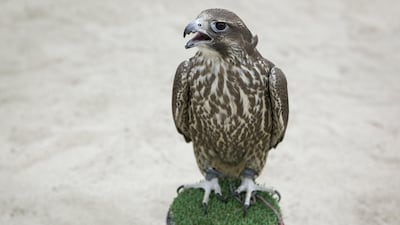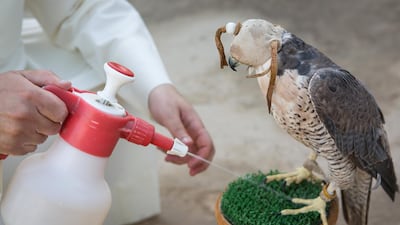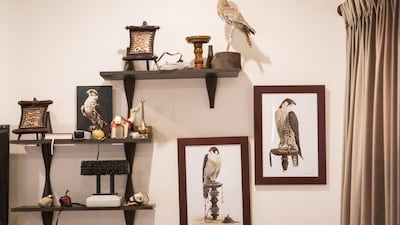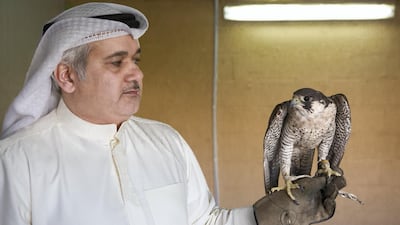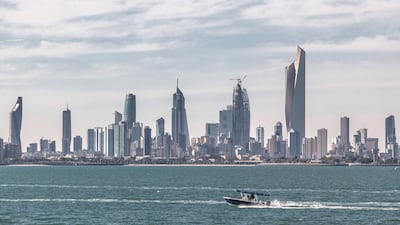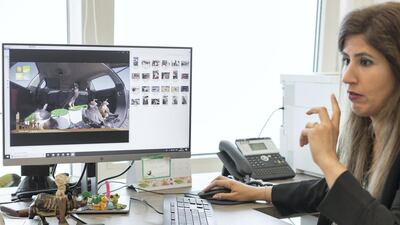Kuwait is making slow progress towards controlling the illegal trade in wild birds of prey despite increased awareness of conservation laws and the growing availability of captive-reared animals.
As in other countries across the Gulf region, the birds are in demand for falconry, a cherished traditional sport dating back thousands of years.
Shereefa Al Salem, the head of the wildlife monitoring section at Kuwait's Environment Public Authority (EPA), estimates that "a very minimum" of 100 falcons enter the country illegally every year.
In just one operation in 2016, the authority seized 20 peregrine falcons, one of the most sought-after species, and three falcons of another species, Ms Al Salem told The National. She refused to reveal further details, but reports in Kuwaiti media said the birds were being smuggled into the country aboard an Iranian boat.
Hashim Al Sulaili, who has held bird auctions in Kuwait for about two decades, makes no secret of his ability to sell wild falcons. He estimates that out of about 200 birds sold through his auction house each year, about a fifth are caught in the wild in Iran and Iraq.
"My auction can sell any wild falcon, even without legal papers," Mr Al Sulaili told The National.
Ms Al Salem’s attempts to stop his trade have failed so far. “I sent Hashim Al Sulaili twice to court for selling wild falcons without legal papers. Yet his auction house is still running,” she said.
After the dealer was acquitted on both occasions, “I am building another case against him”, she said.
Under Kuwaiti environmental law, trading in protected wild animals or their parts carries prison sentences of between one and three years and fines between 5,000 dinars (Dh60,445) and 50,000 dinars, or a combination of both.
But the potential profits far outweigh the fines. Mr Al Sulaili gained fame for selling a falcon for 209,000 Kuwaiti dinars in 2013, a record price.
“It was a wild falcon caught in Kuwait during its migration to Africa. The hunter brought it to my auction and we sold it to the Qatari royal family,” he recalled.
The majority of buyers look for birds that will boost their social status, said Mr Al Sulaili, whose auction house collects a commission on the sale price and serves a range of clients across the Middle East.
“On Instagram, showing off with a falcon is like having a Rolex,” he said.

Mr Al Sulaili claimed that the vast majority of Kuwaiti falconers were opposed to Cites, the Convention on International Trade in Endangered Species that designates which species require protection.
Even so, there is a high level of awareness of the rules. A study on Gulf falconry led by Aisha Al Hamdan for Bahrain’s Arabian Gulf University found that 59 per cent of Kuwaiti falconers say they are well-informed on Cites regulations.
Falconer Ahmed Al Nowaif said he was aware of Cites regulations, but admitted that his peregrine falcon was smuggled in from Afghanistan, via Pakistan and Qatar. "I bought it for Dh16,900, that's what matters," he told The National.
Not only did Mr Al Nowaif get the falcon for what he considered a good price, but he was also able to eventually get it legally registered by taking advantage of the periodic amnesties offered by Kuwait’s Environmental Protection Agency for owners of birds without proper paperwork. For a fee of 10 dinars he received a permit for the bird and a falcon passport that allows him to take it overseas after obtaining special permission from Cites.
Ms Al Salem said the amnesty was first offered in 2006, then in 2011, 2015 and 2018. “Kuwaiti falconers are asking to open registration again this year, the EPA official said. “ In 2018 we received about 1,000 applications. If we reopen registration this year we might get a similar number.”
Ms Al Salem advocates captive breeding and authorising regulated captures to counter widespread trafficking of Cites-listed species. Emphasising her viewpoint, the International Union for Conservation of Nature estimated that threats posed by the falconry trade are uncertain.
The estimated number of mature peregrine falcons worldwide in 2015 was between 228,000 and 443,000, meaning the population was considered secure. The following year, Kuwait proposed downgrading the Cites listing of the species from Appendix 1, which imposes the tightest restrictions, to Appendix 2.
“Ranking the species in Appendix 2 would soften tough the restrictions that regulate captive breeding,” Ms Al Salem said. However, the Kuwaiti proposal failed and the peregrine falcon's status remains unchanged – which creates shortage in the market and encourages trafficking, she said.
According to Ms Al Salem, Kuwait recently proposed a GCC convention specifically for the conservation of falcons as part of a wider regional agreement on the conservation of wildlife, which would ultimately lead to stricter control over trade in the birds and the promotion of captive breeding.
“All countries approved the project already, it should be effective four years after the official signatures,” she said.

One obstacle to increasing the popularity of captive-bred birds is that, unlike their wild counterparts, they must be taught to hunt – a time-consuming process.
But Bader Al Deeri, a former dealer in wild falcons, has no doubt “the future is for breeding”.
After years in the trade, Mr Al Deeri gradually began shifting to captive-bred falcons in the early 2000s. “I knew that one day Cites and the Kuwaiti authorities would ban wild falcons,” he said.
In 2015, Mr Al Deeri opened his own falcon breeding centre in northern Spain, together with a Spanish and an Emirati partner. Last year, he imported about 200 reared falcons to the Gulf, including 42 from his own centre. His Al Kuwaiti Falcon Centre now plans to open a branch in the UK.
“Even Hashim Al Sulaili who built his career on wild falcons has started to import bred falcons. He understood that the market is shifting,” Mr Al Deeri said.
Mr Al Sulaili said that while his auction house still primarily sells birds on behalf of other people, he has also started to import captive-bred falcons from Belgium, Poland, the Czech Republic and sometimes the UK – a total of about 60 birds a year.
The biggest boost for captive-bred falcons could come from a change in falconry in the Gulf in recent years that has seen increasing focus on racing rather than hunting.
“To win, they need the fastest flyers and this gives breeding centres a great advantage over wild falcons as breeders have started to select fast strains,” said Veronique Blontrock, spokeswoman for the International Association for Falconry.
Mr Al Sulaili said half of Kuwait’s falconers had shifted partially towards racing their birds in competitions that are held each year between October and January.
But even falconers such as Ahmad Abbas, whose passion remains for the traditional sport of hunting with falcons, are slowly being won over by captive-bred birds. Earlier this year he bought a saker falcon bred in Germany for 10,000 dinars.
"In the past, captive-reared falcons were not trained, but centres have improved a lot and now educate falcons so perfectly," Mr Abbas, 29, told The National.
Yet there is still a long way to go before attitudes change. Mr Abbas, who also trains falcons for Kuwaiti owners who do not have the time to do it, said most of the birds he handled this year were wild falcons.
Mr Al Sulaili said the restrictions imposed by Cites "close the doors of ancestral traditions" in the Gulf's Bedouin communities.
“We need 10 years before the capture of wild falcons can end,” he said.
